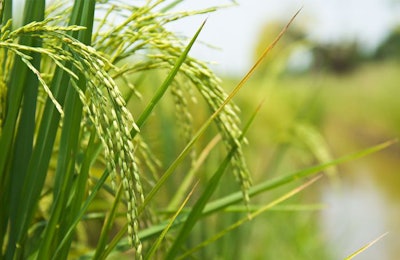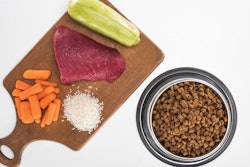
As sources of proteins and other nutrients for pets (at least dogs) as well as humans, plants are having their day in the sun. For example, among eight pet care startups recently selected by Leap Venture Studios to join its “accelerator” program, two feature plant-based pet foods. Petaluma Inc. offers a roasted peanut butter and sweet potato flavored baked dog food (currently sold out); and The Pack, not yet launched, also plans to market a plant-based dog food. (Leap Venture Studio is a partnership between Kinship, a division of Mars Petcare, and Michelson Found Animals.)
If both companies indeed launch and succeed on the market, they will join other companies and brands offering plant-based, even vegan, dog food, such as V-Planet (which has now expanded to Asia), Natural Balance, Nature’s Recipe, Royal Canin, Purina Pro Plan, Evanger’s and more.
I have even read articles or proposals recently suggesting that plant-based diets for cats can be healthy and beneficial—though if any research exists to prove that, it’s definitely in its infancy. (I for one remain skeptical that cats could ever survive, let alone thrive, on vegetarian diets.)
Growing interest in plant-based human foods
Why all the attention and product development with plants in pet food? Well, as with many other trends and categories, it springs from similar, even greater appeal and demand in the human foods sector. An ongoing focus on health and wellness, heightened by the pandemic, is combining with increasing interest and demand for sustainability, fueled by not just environmental issues but also concerns over supplies of traditional, animal-based proteins. Eating plants is perceived by consumers as contributing to both wellness and sustainability.
That perception may be drawing more consumers who typically don’t consider themselves vegetarians or vegans, or eat that way except occasionally. According to 2020 data from Innova Market Insights, 60% of global consumers chose plant-based claims on human food and beverage products over vegetarian or vegan. And in terms of product development, launches of such products with plant-based claims increased 47% from 2016 to 2020, compared to an 8% increase for vegetarian and a 20% rise for vegan claims.
Further confirming that the growth in plant-based appeal lies with overall consumers, not just vegetarians or vegans, Innova’s data also shows that, when asked what they consider a plant-based diet, 32% chose “meat and dairy reduced,” more than mostly or strictly vegetarian or vegan. In addition, when asked what types of products they prefer, 36% of consumers surveyed chose a mix of plants and animals, while the percentages of people choosing 100% plant based or 100% animal based were lower and nearly identical (23% and 22%). Consumers surveyed were in the U.K., U.S., Spain, France, Brazil, India, Germany, Mexico, China and Indonesia.
All these data were presented by Tom Vierhile, VP of strategic insights North America for Innova, during a webinar organized and sponsored by Kerry Animal Performance Solutions. Specific to plant-based protein, he said that claims on human foods and beverages had risen 30% from 2016-2020, and interest and demand are growing further during the COVID-19 pandemic. Consumers surveyed in 2020 in those 10 countries listed above said that in the past 12 months, they had increased their consumption of plant-based protein by 31%, vegetarian meals by 30% and vegan meals by 20%.
Though Innova focuses on the human food market, the research firm does track pet food claims; and Vierhile said that among new pet food product launches between 2016 and 2020, plant-based claims increased 40% and vegan claims, 30%.
Still barriers to overcome and research to conduct
Thus, it seems pet food is closely tracking human food in this area, as in so many others. Accordingly, more pet nutrition research on plants as a source of protein and other nutrients is under way, though it seems it may get lost somewhat among other alternative protein sources for pet food, such as insects, microalgae, pulses and single-cell proteins (yeast species and brewers yeast). Unique protein sources like algae produced from Scotch whisky distillation, wood-eating yeast or invasive/pest animal species (think possums in New Zealand) get all the buzz.
Also, even with human food, it’s not as if plants are destined to replace animals as protein sources anytime soon, if ever. As Vierhile and other researchers have pointed out, consumer concerns over higher costs/value and lower taste and texture remain barriers—and that may well extend to what they want to feed their pets, too. (Not to mention the ongoing, competing belief that pets need high amounts of animal protein in their diets.)
Yet there’s no denying that plants are attracting consumer interest and purchases, and product development is ramping up to meet that demand. Plant-based protein and pet food seem worth monitoring.

















